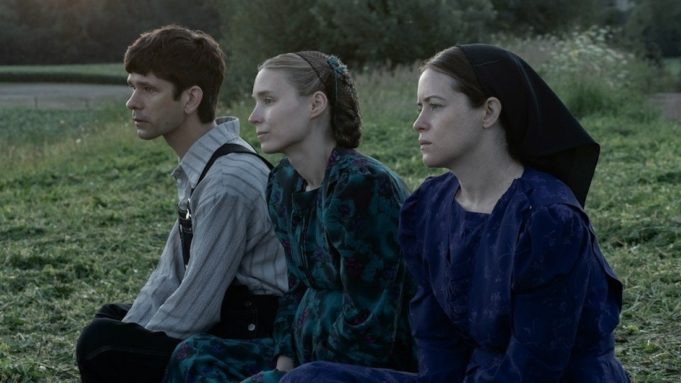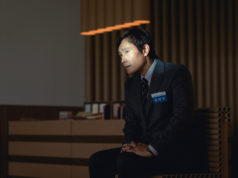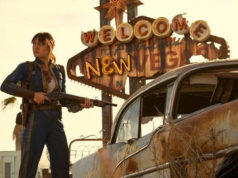I’m usually depressed by the unexpected Oscar nominations, but every once in a while, a pleasant surprise sneaks in. That would be Women Talking, which opens in Tarrant County this weekend after its nods for screenwriting and Best Picture. Maybe the attractions of this self-described act of female imagination aren’t as obvious as with some of its fellow nominees, but the film manages to be hopeful in the face of a potentially grim subject.
The story is based on Miriam Toews’ novel, which in turn is based on a real-life 2010 case at a Mennonite community in Bolivia, where seven men were convicted of sedating more than 150 women with cattle tranquilizers and raping them. (Toews grew up in a Mennonite colony in Manitoba, and people from families she knew founded the colony in Bolivia, which was also called Manitoba.) Some of the case’s details are truly sick, but one that stands out is that the mostly illiterate women spoke German dialect among themselves and had very little Spanish, so merely communicating with the authorities was a challenge.
The film does not delve into that aspect because it has other subjects on its mind. The story mostly takes up a meeting in the aftermath of the perpetrators being arrested for their own protection. The community’s men have gone to the city to bail out the suspects, but not before giving the women an ultimatum: Publicly forgive the men or be forced to leave the colony and also be damned to Hell. The women come up with a third option: Stay and go to war.
While Mariche (Jessie Buckley) is a lonely voice for the status quo, Salome (Claire Foy) wants Biblical justice for whoever raped her 4-year-old daughter and anyone protecting him. The meeting is moderated in more than one sense by Salome’s unmarried sister Ona (Rooney Mara), who is pregnant by a similarly unknown attacker. Other victims ranging from septuagenarian to pre-teen are there to be heard, and the only biological male on the scene is schoolteacher August Epp (Ben Whishaw), who’s there to record the minutes because he’s the only person there who can read and write.
This is the third fiction film by Sarah Polley, and I’ll admit I was a tad disappointed that the movie doesn’t have the same visual flair that characterized her last film, Take This Waltz. The color palette is drab and most of the action — sorry, most of the dialogue — takes place in the same hayloft or just outside the barn. I wasn’t able to find a copy of the novel, but the film does have the feel of a filmed stage play.
No matter; this film has been made to stand on the strength of its writing and acting, and those elements bear out its maker’s decision. Mara is a crystalline presence here, as Ona often clarifies what others express, and Foy doesn’t disappoint in the showiest role, delivering a fiery monologue that ends with Salome inadvertently making the case for leaving: “I will become a murderer if I stay.” Judith Ivey provides some calming strength as one of the group’s elder stateswomen, and Michelle McLeod pilfers a few scenes as a bespectacled, chain-smoking girl who halts the meeting by suffering a panic attack. (Coming out of it, she cites the men initially telling them that the attacks were the work of demons: “They made us doubt ourselves. That’s worse than…”) Hovering on the edges is a transgender man (August Winter) whom everyone still calls Nettie even though he prefers the name of Melvin. He may think of himself as male, but his body is still a woman’s, and his rape may just be the most horrifying one.
Yet this movie’s overall impression isn’t one of horror. Not all the attempts at humor work, but the one touch of the modern world comes in the form of a census taker driving by in his truck while blasting “Daydream Believer,” which the women react to with varying amounts of shock, annoyance, and curiosity. (Meanwhile, August, the only one in a position to recognize the music, quietly sings to himself along with the Monkees.) The song does more than inject a note of bounciness, it also chimes with Ona’s earlier statement that the women must dream of something better because they have no power in their closed-off society.
I like the fact that everyone considers their situation through a Christian prism — no one questions God’s existence or authority, instead finding plenty of fault with the men who have made the rules while claiming to speak for God. It’s not all on the men, though, as August mounts a moving defense of the idea that the colony’s boys can be taught better, and Mariche’s mother (Sheila McCarthy) thinks back to all the times she counseled her daughter to forgive her husband despite him being a drunk and a wife-beater. The film is hard-headed enough to see that Christian forgiveness is sometimes just a tool for enablers. If it’s short on conventional thrills, Women Talking depicts these sequestered characters thinking through all the issues of creating a world for themselves that’s better and closer to God. That’s a different sort of thrill.
Women Talking
Starring Rooney Mara, Jessie Buckley, and Claire Foy. Written and directed by Sarah Polley, based on Miriam Toews’ novel. Rated PG-13.












